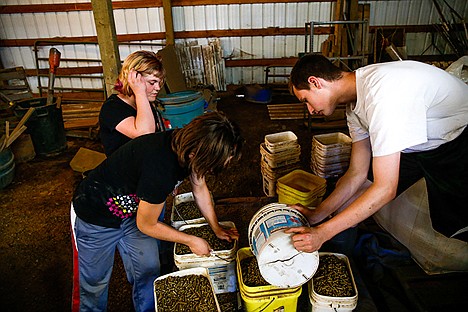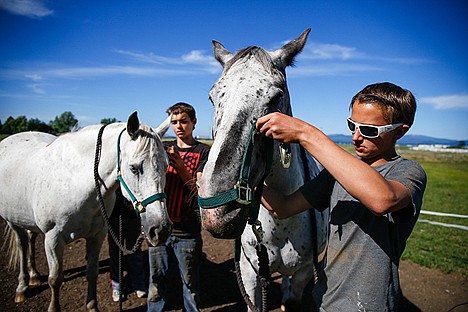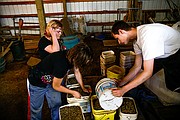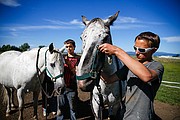Changing lives, one horse at a time (with video)
RATHDRUM — Robert Souza smiles when he talks about spending time at Harmony Ranch.
He gets somewhat of a distant look, like his burdens have been lifted.
“It’s great, I love it. I absolutely love it,” he said. “Horses are beautiful. There’s nothing awkward about them. They’re therapeutic, they’re lovely, help so much. I really enjoy time out here.”
Robert, 17, of Post Falls, has attention deficit hyperactivity disorder. He is one of six young people who will be graduating Tuesday from the Harmony Ranch Therapeutic Riding Center’s equestrian program for at-risk youth.
“Misbehavior was horrible with me,” he said, explaining that he would frequently argue with his mom and brother before entering the program. “I don’t have a dad, so it’s just me and my brother at home. We used to fight quite a lot.”
The 10-week program for at-risk youths from middle- to high-school age is facilitated by ranch owner Diana Clemons in conjunction with Kootenai County Juvenile Probation, the Idaho Department of Health and Welfare and Children’s Mental Health. It focuses on engaging the youths in positive, productive activities while building strong social skills and self-esteem.
“It’s helped me just to have something just to come out to see,” Robert said. “I get to really let go out here.”
Megan Carnie, 13, of Post Falls, graduated the program last year and has been back to volunteer for many of the two-hour sessions. She entered the program after getting into trouble with authorities and being placed on probation.
“If I didn’t do this program, I probably would have a horrible life,” she said.
Megan, articulate and exhibiting a sunny disposition, explained that she had a hard time expressing herself without resorting to anger before her experience at Harmony Ranch.
“My relationship toward my parents has become stronger,” she said. “It’s been a lot calmer ... I haven’t had much anger toward other people. This program just teaches us how to live.”
The first 45 minutes of each session, Clemons delegates ranch tasks to her young clients. With a commanding voice demonstrating ‘tough’ love and respect, she directs them to safely clean horse stalls, scrub troughs, mend fences, pick up rocks and complete other duties the spacious, 10-acre ranch requires. The clients then groom the four therapy horses, place blankets and saddles on them and prepare them for riding, usually while listening to classical music.
“I think that’s really good exercise for the kids. It’s helping kids just learn how to cope with stuff, like being better at expressing their feelings,” Megan said. “Horses, to me, are kind of like people. You have to be calm and gentle around them or else they’re going to get all (cranky) at you.”
Megan said she dreaded the ranch work when she was referred to the program, but after working with the horses, becoming best friends with another girl in the program and feeling positive changes in herself, her mind has changed.
“Horses are really good therapy animals. They help you just be normal,” she said. “I really like working with the horses. I hope to have my own ranch someday.”
Many times, the weekly sessions are attended by probation officers, family members, counselors and others who work closely with the youths. Melissa Kirk, probation officer for the Kootenai County Sheriff’s Office, is in charge of the juvenile mental health docket. Several of her clients are enrolled in the Harmony Ranch equestrian program, which she said is often referred to clients diagnosed with “a serious emotional disturbance.”
“Sometimes when a kid has a mental health issue, it’s hard for the parents to understand behaviors that come out of those mental health issues, and how to best counteract some of those behaviors,” she said. “This program is so great because the kids are trying to get the horses to do certain actions and the horses don’t understand that language. They have to work on that communication and the frustration levels to get the horse to do (an action) and they can relate it to things in their own life.”
Kirk said about seven of her clients have gone through the program, which is presently preparing its third class to graduate.
“I’ve only seen improvements after doing this program. Leaps and bounds,” she said. “You can see a definite change, in self-esteem especially.”
Community-based resource specialist Deon Goodwin of Post Falls is working with one of the kids in the program.
“Hopefully those positive experiences can translate to them making some better choices,” he said. “If they make better choices, then they’re not a burden on society. Then they’re not in jail, they’re not breaking into your house stealing money for drugs. For some people, one positive experience, where they feel they’re doing a really good job and get a lot of positive feedback, can completely change them. I’ve totally seen it.”
Robert said he plans to return to the ranch to volunteer as a mentor, and he is going to miss the program and the horses once he graduates. He said he would recommend the program to other troubled youngsters “in a heartbeat. In an absolute heartbeat.”
“I would tell them about the great experiences about the people in it, but the main thing about how therapeutic the horses are, how easy it is to let go, to change,” he said. “Once you get out here, there’s nothing out there but you and the horse. It’s amazing. You don’t have to worry about problems, you’re out here enjoying yourself.”
Clemons, who has a 21-year-old autistic son, also runs a therapeutic riding program for disabled kids. The mission statement of the ranch is to use “horsemanship, music and the arts to enhance the lives of those in our community who are disabled, at risk or elderly.” She said bonding and working with the at-risk youths is her favorite few hours of the week.
“They take a lot of responsibility because they’ve worked really hard,” she said in a choked voice. “I am one mom. I have a disabled kid. I can’t keep this place by myself. They come and they help every week. I assign them something and they do it, and they’re good-natured about it, and then we have fun with the horses.”
Tuition for the equestrian program for at-risk youth (generally recommended by probation officers) is $400 per client for 10 weeks while the therapeutic riding classes are $100 for four one-hour group classes. Clemons said she is flexible and happy to work with people on payments and some scholarships are available, but the programs are in need of big donations and volunteers to continue changing the lives of those who enroll.
“Diana does a great job with the chores and having them do different responsibilities, and really holding them accountable,” Kirk said. “That horse is depending on them and it gives them that sense of what their parents are going through. And with kids, you can tell them stuff until you’re blue in the face, but they really have to experience it, and this is that venue to bring things all together.”
To donate or learn more, visit www.harmony-ranch.org or call Clemons at 819-2603.





